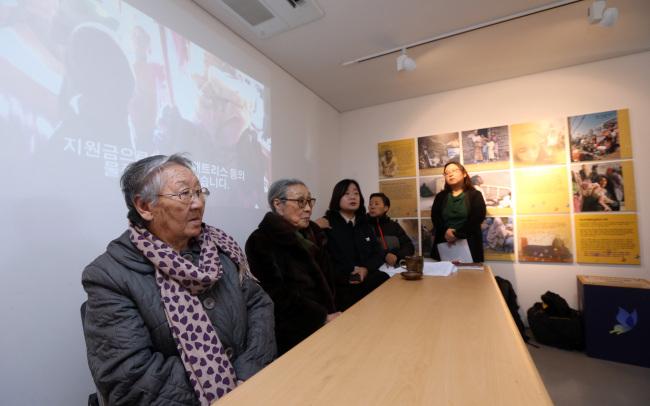Foreign Minister Yun Byung-se on Friday urged Japan to take steps to resolve the sex slavery issue, warning that it will otherwise face “further isolation” from the international community.
He made the remarks upon his return from a U.N. Human Rights Council session in Geneva, where he slammed Tokyo’s move to modify a landmark 1993 statement by then-Chief Cabinet Secretary Yohei Kono, in which the country acknowledged and apologized for its military’s conscription of sex slaves during World War II.
“It’s imperative for the Japanese government to implement earnest measures as soon as possible that are acceptable to the comfort women victims and the international community,” Yun told reporters upon his arrival at Incheon Airport.
“Otherwise, the Japanese government and political leaders will become further isolated and suffer continuous pressure.”
He made the remarks upon his return from a U.N. Human Rights Council session in Geneva, where he slammed Tokyo’s move to modify a landmark 1993 statement by then-Chief Cabinet Secretary Yohei Kono, in which the country acknowledged and apologized for its military’s conscription of sex slaves during World War II.
“It’s imperative for the Japanese government to implement earnest measures as soon as possible that are acceptable to the comfort women victims and the international community,” Yun told reporters upon his arrival at Incheon Airport.
“Otherwise, the Japanese government and political leaders will become further isolated and suffer continuous pressure.”

The sex slavery issue took center stage at the HRC session, with diplomats of Korea and Japan exercising their “right of reply” to dispute each other’s claims.
Envoys from China and North Korea chimed in, denouncing a recent string of moves and remarks by Japanese officials and politicians whitewashing the country’s imperial past.
Attempting to refute Yun’s speech on Wednesday, Japan’s deputy representative in Geneva Takashi Okada said Thursday that his government has not changed its position since the Kono Statement.
But he said that the compensation issue was already settled, namely through a 1965 agreement that normalized diplomatic relations between Seoul and Tokyo.
Seoul is demanding sincere apologies and compensation for the aging victims.
His Korean counterpart Yoo Yeon-chul shot back quickly, saying the issue has never been fully addressed in any bilateral or multilateral accords, and thus Japan still bears legal responsibilities.
Yun stressed the universality of the issue, calling on Japan to come clean about its wartime atrocities, take responsibility and provide accurate history education to young generations.
“This is about the international community’s human rights, beyond bilateral relations between Korea and Japan,” he said.
“(The session) provided a good chance to hammer that point home to all participants.”
It was the first time a top South Korean diplomat brought up the issue and criticized Japan by name at the U.N., reflecting Seoul’s toughened stance in line with Tokyo’s accelerating swing to the right.
Last Friday, Japan’s Chief Cabinet Secretary Yoshihide Suga said the Shinzo Abe administration plans to set up a team to “reevaluate” the Kono Statement. His deputy Hiroshige Seko said Thursday that after a review it will explain the results to the international community.
The apology, along with a 1995 statement by former Japanese Prime Minister Tomiichi Murayama, had set the stage for a thaw in ties between the two former foes.
Up to 200,000 women, mostly Koreans, are believed to have had been forced to work in brothels for Japanese troops during World War II. Of the 237 Korean women who came forward as former sex slaves, 55 are still alive.
By Shin Hyon-hee (heeshin@heraldcorp.com)
-
Articles by Korea Herald









![[Today’s K-pop] BTS pop-up event to come to Seoul](http://res.heraldm.com/phpwas/restmb_idxmake.php?idx=644&simg=/content/image/2024/04/17/20240417050734_0.jpg&u=)

![[Graphic News] More Koreans say they plan long-distance trips this year](http://res.heraldm.com/phpwas/restmb_idxmake.php?idx=644&simg=/content/image/2024/04/17/20240417050828_0.gif&u=)






![[KH Explains] Hyundai's full hybrid edge to pay off amid slow transition to pure EVs](http://res.heraldm.com/phpwas/restmb_idxmake.php?idx=652&simg=/content/image/2024/04/18/20240418050645_0.jpg&u=20240419100350)

